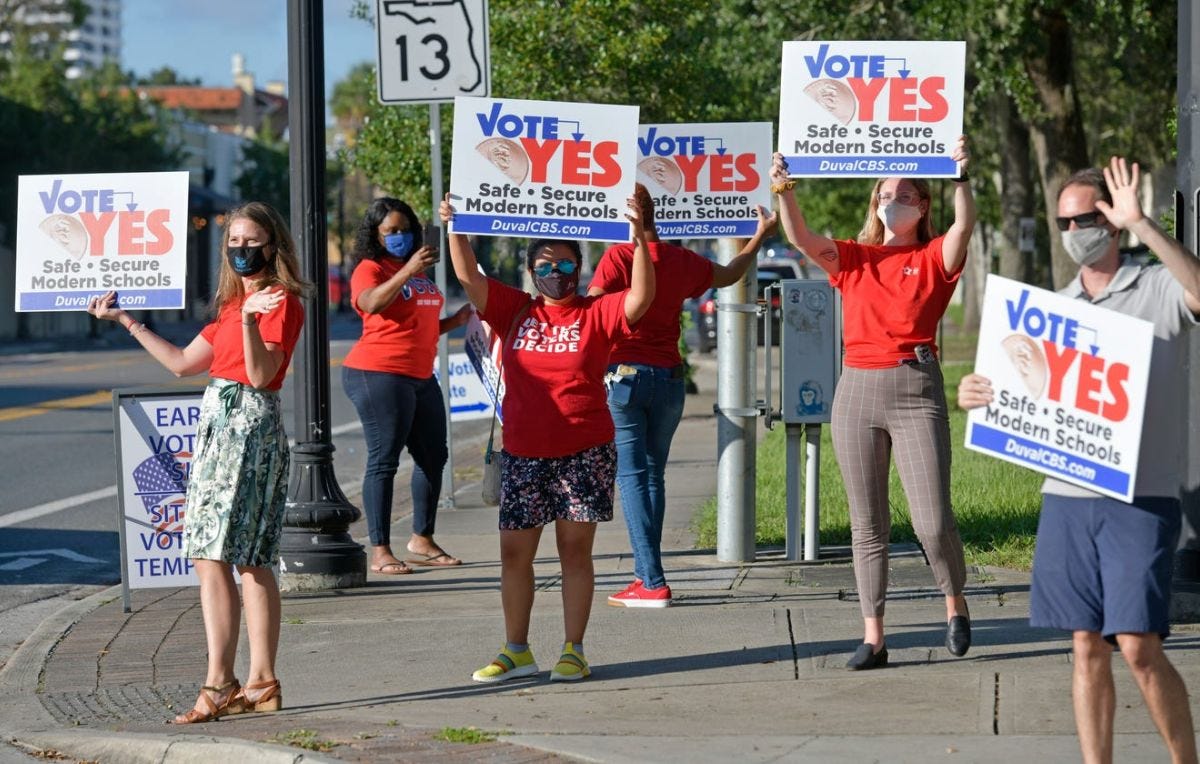Good morning! It’s Thursday, March 18, 2021. Election Day 2022 is 600 days away. Election Day 2024 is 1,328 days away.
Do you appreciate receiving Wake Up To Politics in your inbox every morning? Then consider sending this newsletter to a friend or relative who might appreciate it as well! Tell them to subscribe at wakeuptopolitics.com.
A filibuster reality check
On Wednesday, I wrote about the brewing showdown between President Joe Biden and Senate Minority Leader Mitch McConnell over the filibuster.
Biden’s interview with ABC News on Tuesday gave progressives hope that they may have gained a powerful ally in their crusade against the filibuster, which currently stands in the way of much of the Democratic legislative agenda, from voting rights to gun control to immigration.
But comments from Democratic senators throughout the day on Wednesday proved that getting rid of the filibuster — or even modifying it, as Biden suggested — will still remain an uphill battle.
“After seeing it operate in the majority and the minority, I can see it’s a double-edged sword,” Sen. Angus King (I-ME) told reporters. “And Democrats may be very intent in getting rid of it now, but that means they won’t have it as a protection under a future Republican president and Republican Senate.”
Sen. Dianne Feinstein (D-CA) raised the same concern. And centrists such as Joe Manchin (D-WV), Jon Tester (D-MT), and Kyrsten Sinema (D-AZ) remain firm in their support of the filibuster as well.
In short: Democrats do not have 50 votes to change the filibuster, whatever Joe Biden may say. Far from it. According to Politico, at least nine Democratic senators expressed concerns about scrapping the filibuster on Wednesday, placing any changes to the rule out of reach — at least for now.

But progressives are putting together a plan to counter that wall of opposition. According to CNN, they are hoping the calculus will change as major pieces of legislation begin to be blocked under the current rules; the first showdown could be over a sweeping voting rights package that has been given first priority by Democrats in the House and Senate. (Republicans have yet to filibuster any bill this Congress, since Democrats rushed through the $1.9 trillion stimulus package via the reconciliation process, which is immune to filibusters.)
“If Republicans block S.1, that will turn up the heat on taking away Mitch McConnell’s veto,” Sen. Elizabeth Warren (D-MA) predicted. A pressure campaign by progressives has already found success at the White House.
But any rule changes would hinge on removing the 60-vote threshold that is currently embedded in the filibuster. And that will take unanimous support from Democrats on the other end of Pennsylvania Avenue, in the Senate. And Manchin, for one, made clear on Wednesday that a 60-vote requirement remains his “red line.”
He told CNN’s Manu Raju that he opposed changing the rules to require 41 senators to continue a filibuster, instead of requiring 60 to end one. And he objected to proposals that would create exceptions to the filibuster for voting rights: “That’s a little bit like being pregnant — maybe.”
“I’m still at 60... I haven’t changed,” Manchin said.
The Rundown
— Investigators charged a suspect on Wednesday in the Atlanta rampage that killed eight people, including six women of Asian descent.
— The IRS will delay the April 15 tax deadline until May 17 to give filers more time amid the pandemic.
— Katherine Tai became the first Biden Cabinet nominee to be confirmed unanimously. She will be the first Asian-American and the first woman of color to serve as U.S. Trade Representative.
— Intelligence agencies issued their first joint report on domestic terrorism in the United States, warning that extremists pose an “elevated threat” to the nation’s security.
— The pace of new coronavirus cases in the U.S. is stabilizing at about 55,000 per day, as the speed of vaccinations increase.

Legal Roundup
Contributed by Anna Salvatore
Two men have been arrested and charged with assaulting Capitol Police Officer Brian Sicknick, who died after the January 6 riots at the Capitol. According to BuzzFeed News, Julian Khater, 32, and George Tanios, 39, planned their attack on video footage. After Khater said, “Give me that bear [spray],” the men shot the chemical substance into the eyes of three Capitol Police Officers, including Sicknick, on the lower west terrace of the Capitol building.
One of the injured officers reported scabbing under her eyes for weeks; another testified that the substance was “as strong as, if not stronger than, any version of pepper spray they had been exposed to during their training.” If Khater and Tanios are convicted of assaulting federal officers, obstructing a federal proceeding, and violent entry, they could spend decades in prison.
Liberal law professors are publicly calling on Justice Stephen Breyer to step down. In an op-ed for the New York Times on Monday, Colorado law professor Paul Campos wrote that “Justice Ginsburg was widely, and deservedly, criticized for her refusal to retire” when then-President Barack Obama could have replaced her. He argues that the 82-year-old Justice Breyer is making the same mistake, one made even more egregious because the Democrats’ slim majority will not last long in the Senate. The White House is reportedly preparing for a Breyer vacancy; according to the Times, the main contenders are District Judge J. Michelle Childs, District Judge Ketanji Brown Jackson, and California Supreme Court Justice Leondra Kruger, all of whom are Black women.

Since 2015, dozens of parties have sued Purdue Pharma for marketing an addictive painkiller called OxyContin — a drug which fueled the opioid epidemic and killed hundreds of thousands of Americans. Now Purdue Pharma is bankrupt. In an attempt to stave off further lawsuits, the company released a plan on Monday to reimburse addicted customers, their families, and their local governments; remove the billionaire Sackler family from control; and devote its remaining money to combating drug addiction.
If the plan is approved by a federal judge, state and local governments will choose the people who run Purdue Pharma. The New York Times notes that the Justice Department may still pursue criminal charges against the Sackler family, who claimed in a statement that they acted “ethically and lawfully.”
More legal headlines from Anna:
Federal Circuit Judge Evan Wallach announced on Tuesday that he will be taking senior status. According to the Alliance for Justice, this is the 12th circuit vacancy and 99th overall judicial vacancy to open under President Biden.
Last Thursday, a 7th Circuit panel issued a high-profile ruling on abortion. By a 2-1 vote, the judges affirmed that Indiana can’t require parental notification when minors seek an abortion.
“As many as sixty thousand people in the United States practice polygamy,” the New Yorker reports. After the Supreme Court’s Obergefell decision legalizing same-sex marriage, polygamist families are pushing for greater recognition from the government.
Sen. Sheldon Whitehouse has asked the FBI to review its background check on Justice Brett Kavanaugh. In a letter to Attorney General Merrick Garland, Whitehouse argued that the FBI didn’t interview key figures — such as Christine Blasey Ford — about Kavanaugh allegedly assaulting Ford at a high school party.
Ask Gabe
Q: I’m told that citizens, with enough signatures, can get a national referendum on the ballot. I don’t recall this happening on a national basis. How hard is it and what's involved? — Ted from New Haven, Connecticut
A: Although most states have mechanisms for voters to place direct initiatives or referenda on state ballots by gathering signatures, there is no process for a national referendum to be added to ballots in the United States. The closest alternative can be found in Article V of the Constitution, which allows two-thirds of the state legislatures to call a national convention for proposing constitutional amendments. (The amendments would still need to be ratified by legislatures or ratifying conventions in three-fourths of the states.) An “Article V convention” has never been called.
Do you have a burning question about politics? Send it over to gabe@wakeuptopolitics.com and it might get answered in the newsletter! Don’t forget to include your first name and where you’re from.
Daybook
All times Eastern.
Executive Branch
President Joe Biden will receive the President’s Daily Brief at 9:30 a.m., a COVID-19 briefing at 1:15 p.m., and his weekly economic briefing at 2:15 p.m. Then, at 3:15 p.m., he will deliver remarks on the state of vaccinations.
Vice President Kamala Harris will join Biden for the three briefings and for his vaccination remarks. She will also ceremonially swear in Deb Haaland as Secretary of the Interior at 10:30 a.m. and Katherine Tai as U.S. Trade Representative at 6:15 p.m. Harris will also meet with women labor leaders at 11:15 a.m. to discuss the American Rescue Plan.
Secretary of State Antony Blinken and Defense Secretary Lloyd Austin will meet with South Korean officials in Seoul. Later, Blinken and National Security Advisor Jake Sullivan will meet with Chinese officials in Anchorage, Alaska.
White House Press Secretary Jen Psaki and Secretary of Housing and Urban Development Marcia Fudge will hold a press briefing at 12:30 p.m. Legislative Branch
The Senate will convene at 10 a.m. and resume consideration of Secretary of Health and Human Services nominee Xavier Becerra. The chamber will vote at 12 p.m. on Becerra’s confirmation and then hold a cloture vote to advance Labor Secretary nominee Marty Walsh at 1:30 p.m.
The House will convene at 12 p.m. and consider two immigration bills: the American Dream and Promise Act, which would create a path to citizenship for “Dreamers” who were brought to the U.S. illegally as minors, and the Farm Workforce Modernization Act, which would offer a path to legal status for immigrant farm workers. The House will debate each bill for an hour before voting on them.
The chamber may also vote under “suspension of the rules” (a fast-track process that requires bills to pass with two-thirds support) on a resolution condemning the coup in Burma and on the Protect Democracy in Burma Act, which would take steps to further condemn the coup on the world stage.
The Senate Health, Education, Labor, and Pensions Committee will hold a hearing on COVID-19 response with NIAID Director Anthony Fauci and CDC Director Rochelle Walensky at 10 a.m.
The House Judiciary Committee will hold a hearing on “discrimination and violence against Asian-Americans” at 10 a.m. with Sen. Tammy Duckworth (D-IL) and other witnesses.
The House Ways and Means Committee will hold a hearing with IRS Commissioner Charles Rettig at 2 p.m.
Judicial Branch The Supreme Court is not in session.
Thanks for waking up to politics! If you enjoy reading this newsletter, I’d be so grateful if you’d consider donating to help support me and my work. If you want to show off your support for Wake Up To Politics, you can also buy some merchandise.
Also: don’t forget to tell your friends and family to sign up for the newsletter at wakeuptopolitics.com. And if you have any questions or comments, feel free to email me at any time.






